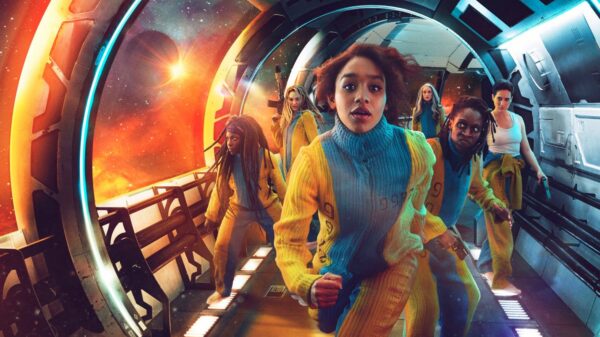Sky One’s new original eight-part space opera acknowledges its debts to its small screen forebears and antecedents without apology. Intergalactic stands squarely in the tradition of shows as far apart in the TV timeline as Blake’s 7 (1978-81) and Firefly (2002). It’s a big, playful, energetic exploration of high-stakes, high-concept sci-fi. And despite the occasional irritations of an uneven and overwrought plot, it’s an engaging watch that’s crafted with a great deal of swagger.
Intergalactic opens on a future Earth in which a new, high-tech civilization has been built on top of the flooded ruins of the old world. The authority of the Commonworld stretches across the planet, but this global government’s rule is challenged by the rebels of the ARC; a group of self-styled freedom fighters that the Commonworld insists are terrorists and wreckers.
On-board rebellion
Ash Harper is a young police pilot, who finds herself facing serious criminal charges. Despite protesting her innocence, she’s found guilty and sentenced to penal servitude off-world. But a rebellion on board the prison transport ship Hemlock allows the inmates to seize control of the vessel. As they begin to chart their way around the galaxy, these ill-matched crew mates argue about how best to retain their newfound liberty. The Commonworld authorities are soon in pursuit, determined to seize the ship, recapture the rebels and thwart the ambitions of the ARC.
What’s immediately striking when settling in to binge-watch Intergalactic is the richness and detail of the show’s design. The CGI elements, which deliver the planetscapes, the ships and the space combat, are high-quality and rendered with a commendable style. The extensive interiors of the Hemlock have the look of a film set, with the corridors, bulkheads, airlocks and flight deck all having that sought-after appearance as constructs of genuine substance. The planet locales that the crew visit as their mission unfolds are also realised on-screen through some immersive and distinctive design work. The show is cleverly lit, framed and shot throughout, which means that Intergalactic is pretty sumptuous to look at.
Much unexplained
It’s when it comes to characterisation and plotting that things are a little less glowing. Given the story space that’s provided by eight episodes, the series’ central conflict – between the Commonworld and ARC – remains pretty sketchy. It’s clear that the rebels want to do away with the ‘tyranny’ of the Commonworld, and that Earth’s rulers want to wipe out the ‘murderous’ ARC. But beyond that, little time is spent colouring in that sketch. The writers may hope that leaving so much unexplained will encourage viewers not to make snap decisions about which protagonists are on the right side of (future) history. But this is a struggle to decide the future of the galaxy that instead feels underwritten, and which takes second place to the episodic jeopardy.
The Hemlock is a crowded ship, with a large ensemble of crewmembers vying for attention and screen time. The make-up of the crew is encouragingly diverse, and Intergalactic places strong female characters (human and alien) at the centre of the story throughout. The different motivations of those on board is established through a lot of squabbling and shouting in the first couple of episodes.
But things then settle down, as new loyalties are forged, secrets come to the fore and hidden agendas are exposed. By the series’ mid-point some interesting and unexpected new alliances have been forged and put to the test. Some of the joins that connect family members on opposing sides of the conflict do feel arbitrary and artificial though.
Pace and tempo
Amidst the strong cast, it’s inevitably the more troubled and morally complex characters (rather than the no-nonsense heroes) that draw the attention. Eleanor Tomlinson (Poldark’s Demelza) is excellent as the conflicted ‘evolved human’ Candy; especially as she becomes less ‘kooky’ as the series progresses. Diany Samba-Bandza brings a sense of vulnerability to the role of the ‘cybernetically enhanced’ Genevieve Quik, who’s exploited by her merciless mother Tula (Sharon Duncan-Brewster in relentless hard-ass mode). Imogen Daines impresses as the no-nonsense hacker and gunslinger Verona Flores; while, as soft-hearted prison ship guard Drew Bunchanon, Thomas Turgoose puts in a likeable performance that’s so naturalistic it almost feels out of alignment with the heightened characters and futuristic setting around him.
The series keeps up its pace and tempo throughout and, after a reasonably diverting set of adventures, it delivers a cliffhanger ending that leaves the show demanding a recommission. Intergalactic is so pleasing to look at, that it’s easy to immerse yourself in the richness of its imagined worlds. It’s great to see Sky commissioning an unashamed space opera, and a second series would be able to up the ante on the decisive clash between the two sides. But it’s arguable that the show would have worked better at five or six instalments all focused on the main storyline. At the conclusion of eight episodes, while there’s been plenty of movement, intrigue and conspiracy, not much has been settled.
![]()
Intergalactic is available to watch now on Sky One and through the Sky Go app.

